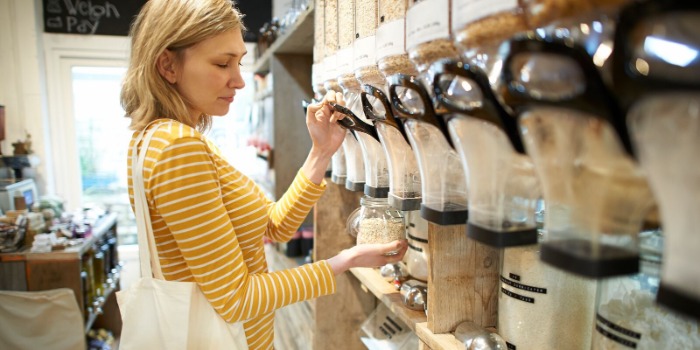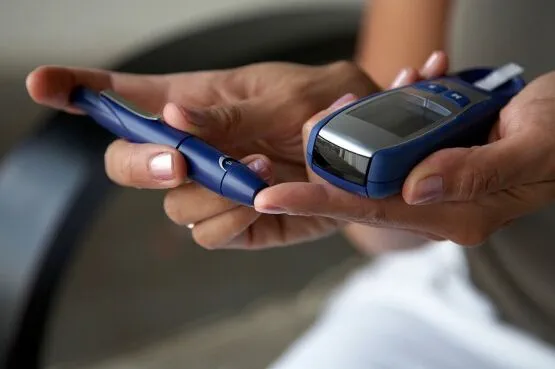Five ways to reduce food waste
Reducing the amount of food you waste is a great way to help the planet. It can also help you to eat well and even save some money! By being more organised and getting creative, you can cut down on how much food is sent to landfill. Here I share some top tips for reducing the amount of food waste you make and how to make it as easy as possible.

Why is food waste a problem?
Wasting food is a problem for many reasons. When you waste food, you also waste all the resources it took to make it. This includes things like energy, land and water. As well as this, if food waste goes to landfill, it produces greenhouse gases as it rots, contributing to climate change.
Food waste from our own kitchens makes up most of the food that gets wasted each year. In the UK alone, this is around six million tonnes. That’s enough to fill about 750,000 skips!
The good news is that there is some research that suggests we’ve all managed to waste less food during lockdown. So, whether you’re looking to stick to these food-saving habits, or form new ones, here are some tips for avoiding food waste.
How to avoid food waste
1. Get organised
Try to plan your meals in advance. This can help you to only buy the ingredients you’ll use. You could also try planning your meals based around seasonal foods. Seasonal foods often take less energy and resources to get to you, which means they have a lower carbon footprint. You might be tempted to order a takeaway when you don’t feel like cooking but try to use up what you have in the cupboards whenever you can. You might find this also helps you to eat more healthily.
2. Learn about labels
Once you’ve bought your food, make sure you know when it needs to be used by. This is so that it doesn’t go off before you’ve had a chance to eat it. Remember that ‘best before’ dates are just a guide and is about the quality of the food. You can use your senses to help you decide a food that’s gone past it’s ‘best before’ date is still edible’.
But it’s important to remember that if a food has a ‘use by’ date on it - you mustn’t eat it after this date. Don’t take the risk, even if you think it looks or smells normal. This is because you can’t see or smell all the different types of harmful bacteria. If you notice that some of your ingredients are about to go out of date, try cooking in bulk to use them up. You can also freeze a lot of foods before they go out of date.
Learning about date labels and how to freeze and store foods properly might help you to feel more confident about what does and doesn’t need to be thrown away. Love Food Hate Waste have lots of information about this.
3. Use up your leftovers
Even if you follow a meal plan, there’s a chance you’ll end up with some leftover ingredients lurking in the bottom of your fridge. Instead of throwing these away, try looking for recipes that will help you use them up. There are even recipes for the peels and skins of fruits and vegetables. It can be a great way to learn new cooking techniques and experiment with new flavours.
4. Rescue food from being wasted
As well as making use of your own leftovers, you can also help save food from shops and restaurants being wasted. You could try signing up to a scheme which saves wonky fruit and vegetables from going to landfill.
Emily subscribes to a vegetable box and says “There’s such a variety of produce and it’s often things that I would never have considered buying in the shops. This means that I don’t get bored as I’m not eating the same things each week. The recipes ideas that come with the boxes are handy for when I am lacking inspiration or am not sure what I could make with the combination that has arrived that particular week!”
There are also apps which help restaurants and shops sell or give away extra food. Once you sign up, you’ll get alerts about local businesses who have food that would otherwise go in the bin. Some areas also have a community fridge where you can drop off food you no longer need. If you don’t feel like cooking, why not visit it and see what’s available?
5. Use a food waste bin
When you do have food that can’t be eaten, such as pips or stalks, try to get rid of it in a sustainable way. Separating your food waste from your other rubbish makes sure that it doesn’t go into landfill. Many councils will send you a food waste caddy for free. If your local area doesn’t have food waste facilities, you could try composting it yourself at home.
Getting started
Changing your shopping, cooking and eating habits might feel daunting. So, start with some small steps that feel achievable for you.
Here are some things that might help you to make a change.
- Keep track of what’s in your fridge so you don’t overbuy. Try to get into the habit of taking a picture of what you have before heading to the shops.
- Set aside one night of the week to eat food from your freezer or cupboards.
- Organise your fridge so that the foods that need eating soon are easier to grab.
- Keep an area of your freezer free for leftovers in case you cook too much or decide not to eat your planned meal.
- Track your progress, so you can see the impact you’re making.
- Try to only buy what you need, instead of stockpiling food ‘just in case’.
Try to remember the value of food and make the most of what you have.
-
Sources Sources
- Fight climate change by preventing food waste. World Wildlife Fund. www.worldwildlife.org, accessed 19 October 2021
- Food surplus and waste in the UK – key facts. Wrap. www.wrap.org, updated October 2021
- Food waste in the UK. UK Parliament. www.lordslibrary.parliament.uk, published 12 March 2021
- Life under Covid-19: Food waste attitudes and behaviours in 2020. Wrap. www.wrap.org, accessed 19 October 2021
- Best before and use-by dates. Food Standards Agency. www.food.gov.uk, updated 19 March 2021
- Date labels – what do they mean? Love Food Hate Waste. www.lovefoodhatewaste.com, accessed 19 October 2021
- Being thrifty with your food. Love Food Hate Waste. www.lovefoodhatewaste.com, accessed 19 October 2021
- Community fridges. Hubbub. www.hubbub.org.uk, accessed 19 October 2021
- Top tips for a beautiful food waste bin. Friends of the Earth. www.friendsoftheearth.uk, published 14 Aug 2017
- Learn how to store your food. Love Food Hate Waste. www.lovefoodhatewaste.com, accessed 19 October 2021
About our health information
At Bupa we produce a wealth of free health information for you and your family. This is because we believe that trustworthy information is essential in helping you make better decisions about your health and wellbeing.
Our information has been awarded the PIF TICK for trustworthy health information. It also follows the principles of the The Information Standard.

More general health advice articles
Did you find our advice helpful?
We’d love to hear what you think. Our short survey takes just a few minutes to complete and helps us to keep improving our healthy lifestyle articles.
Legal disclaimer
This information was published by Bupa's Health Content Team and is based on reputable sources of medical evidence. It has been reviewed by appropriate medical or clinical professionals and deemed accurate on the date of review. Photos are only for illustrative purposes and do not reflect every presentation of a condition.
Any information about a treatment or procedure is generic, and does not necessarily describe that treatment or procedure as delivered by Bupa or its associated providers.
The information contained on this page and in any third party websites referred to on this page is not intended nor implied to be a substitute for professional medical advice nor is it intended to be for medical diagnosis or treatment. Third party websites are not owned or controlled by Bupa and any individual may be able to access and post messages on them. Bupa is not responsible for the content or availability of these third party websites. We do not accept advertising on this page.







